Allow me to introduce you to your newest sales hire.
This new team member will…
- Never forget a detail
- Sell with complete integrity
- Absolutely dazzle your prospects
Even better, they’ll never expect a sales commission or even ask for a day off.
Ready to meet your new employee?
It doesn’t matter what you sell, be it life insurance or animal figurines, the art of the sale has changed. Long gone are the days of the slick used car salesman and hard closing. Consumers now control the sales process.
We have more choices than ever, while at the same time, we have less and less time to make our buying decisions. While the internet has forever changed the way we shop, the never-ending sea of buying options online can be daunting to say the least.

Enter chatbots.
Selling with chatbots give business owners and marketers a simple, yet flexible framework to deliver a new type of buying experience. A well-designed Messenger bot can be just as insightful as a traditional website, while being much more efficient (not to mention more entertaining)!
Thanks to point-and-click chatbot makers like ManyChat, you can now design a dynamic interface that’s not only unique to your business, but will also customize itself for each individual user.
Bots are already being used to sell everything from cars to card games. If China’s WeChat is any indicator of where the market is going, commerce on Messenger apps has only just begun.

With bots, it’s as much of a sorting process as it is a sales process. After all, bots were originally developed for the purpose of customer service. As the line between support and sales continues to blur, selling with chatbots has proven to be powerful for generating revenue.
And if you’re skeptical, don’t worry, because I was too. In fact, when our marketing team at Clever Investor approached me about entering the chatbot marketplace, I shot down the idea several times. My misconception was that a bot would create a disconnect from our customers.
Turns out that, when done right, it is quite the opposite. As you’ll learn by the end of this article, a great chatbot drives sales by helping you develop REAL connections with your customers, both online and offline. ❤️
Here are the 5 element elements for learning how to build chatbots and use them to boost your business.
Essential Element to Selling With Chatbots #1. Conversation is for Closers
Grab Their Attention
Conversational Marketing is the name of the game today. By involving users in a 2-way interactive conversation, a chatbot can do something is nearly impossible to do: get 100% attention from your user. This is simply not possible with a website, email, video or any other 1-way communication method.

It’s been said that our attention span online is shorter than that of a goldfish. Bots solve this problem by keeping users involved and moving from one step to another.
Like with any sales message, always hook the user out of the gates by answering the question, “What’s in it for me?”
Make the Connection
Like in any relationship, the rapport between your bot and your prospect is critical. When designing your conversation flow, don’t try to make money with your chatbot right out of the gate. When in doubt, think about the way you’d communicate in person.
Keep in mind that chatbots are especially effective at getting answers to tough questions. We’ve found that people are much more open with a bot about their challenges or issues such as budget. That said, you should never ask a sensitive question without first showing value and context for what you’re trying to solve by asking sensitive questions.
Mix It Up
Nobody likes talking to someone who rambles, so be sure to avoid using big blocks of text in your flows (interactive bot experience). Limit text to a few lines at a time and intermix your messages with questions and various media.
Bots allow you to add images, video and audio, as well as unique content elements including cards, lists and galleries.
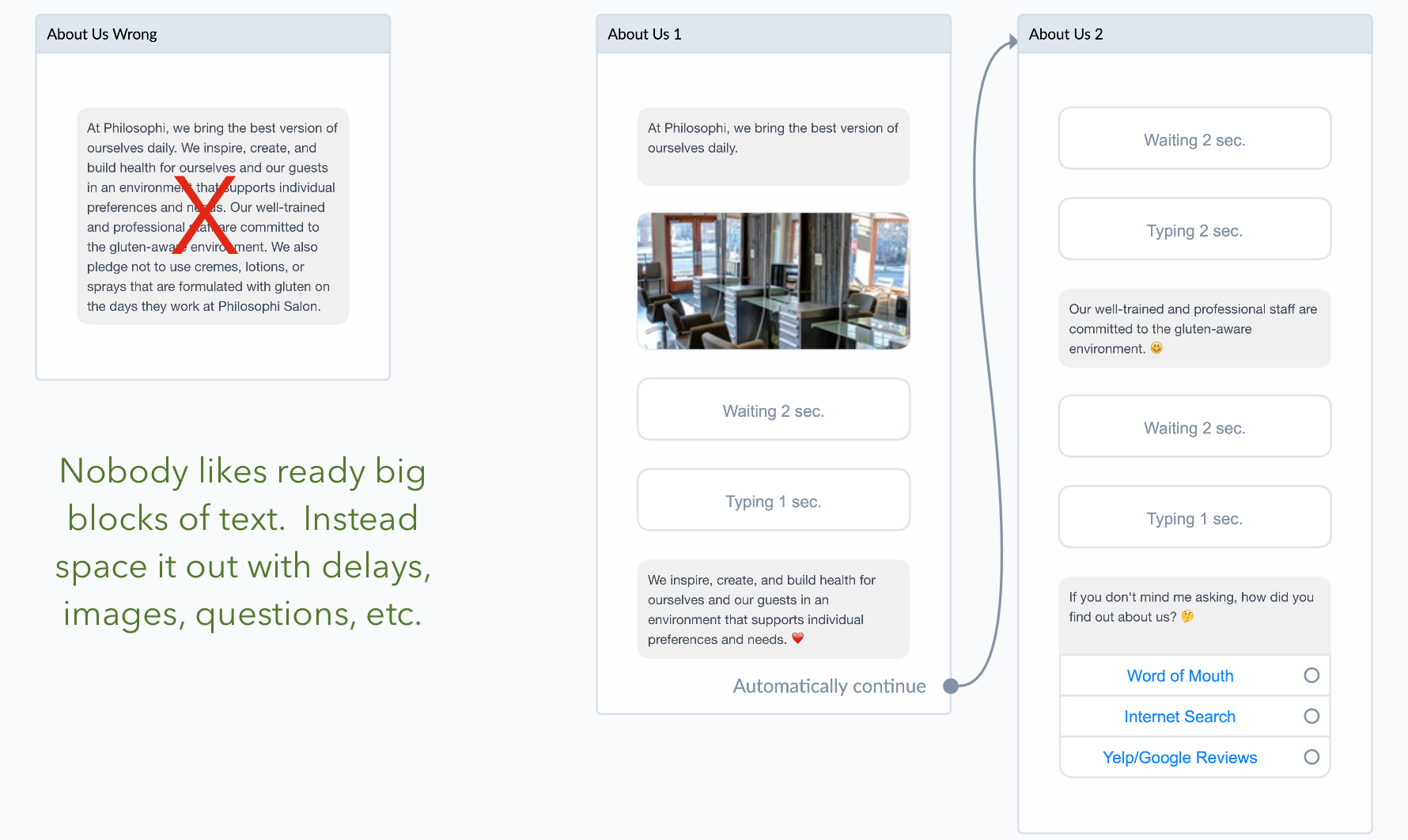
Try not to go more than 15-20 seconds without involving the user in some sort of interaction, most commonly to answer a question by clicking a button.
Keep It Real
While you should design with human-like conversation in mind, you should never try to fool the user into believing your bot is human. This is one of the biggest misconceptions about Messenger Marketing. It’s difficult to do, and if your user feels bamboozled, you’ll completely lose their trust.
We always recommend creating a fun character for you bot!
(RELATED: 11 Best Facebook Chatbots That Engage Customers in 2019)
Chatbots with a personality are not only fun and engaging, it gives you the chance for your bot to edify you as a third party.
Refine Your Timing
New bot builders often struggle to deliver content with conversational timing. To keep users engaged, never give them more than they can chew on at any given time.
Ideally, you’ll want to have the next content appear right before the user finishes the previous content.
After delivering a message, we recommend first using a “waiting” delay while your user is reading, then followed by a “typing” delay that begins right before they finish. This keeps the conversation flowing.
Humor and GIFs
Anyone in sales knows that “when they’re laughing, they’re buying.” Chatbots are the perfect medium for showing off your inner comedian and one of the easiest ways to do so is with GIF images. Since GIFs take a few seconds to load, if you’re not careful you will lose people if they have to wait.
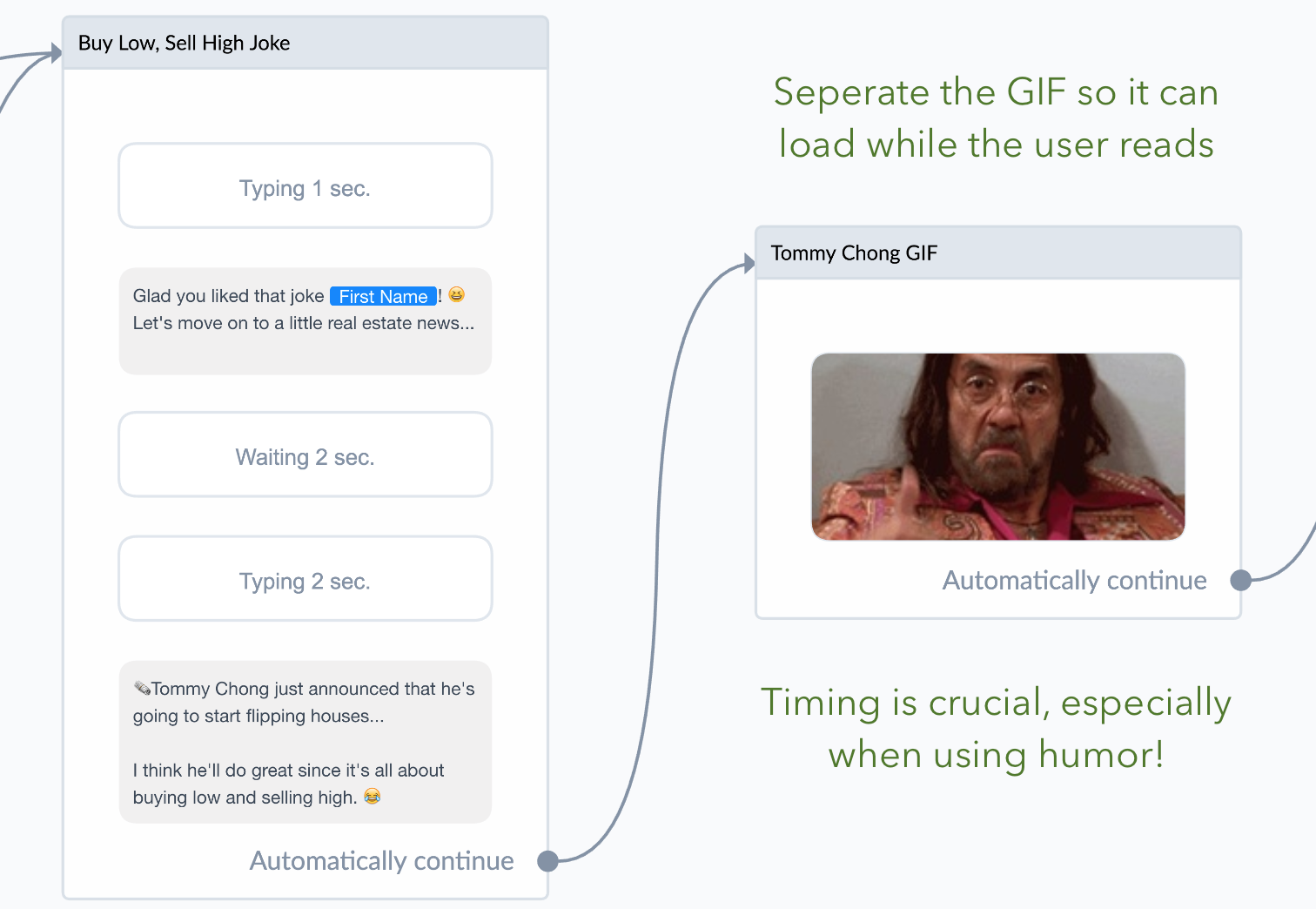
To solve this, make sure your GIFs follow a message box that contains several lines of text. That way, as the user finishes reading the text, the GIF appears on cue.
Let Them Drive
When describing bots to newbies I often compare them to the “Choose Your Own Adventure” books we read as kids. Bot building interfaces such as the Flow Builder make it easy to customize a user’s experience with buttons and conditional logic. While most bots provide linear experiences (like a logic tree) we’ve found that user’s respond well when the conversation is more natural.
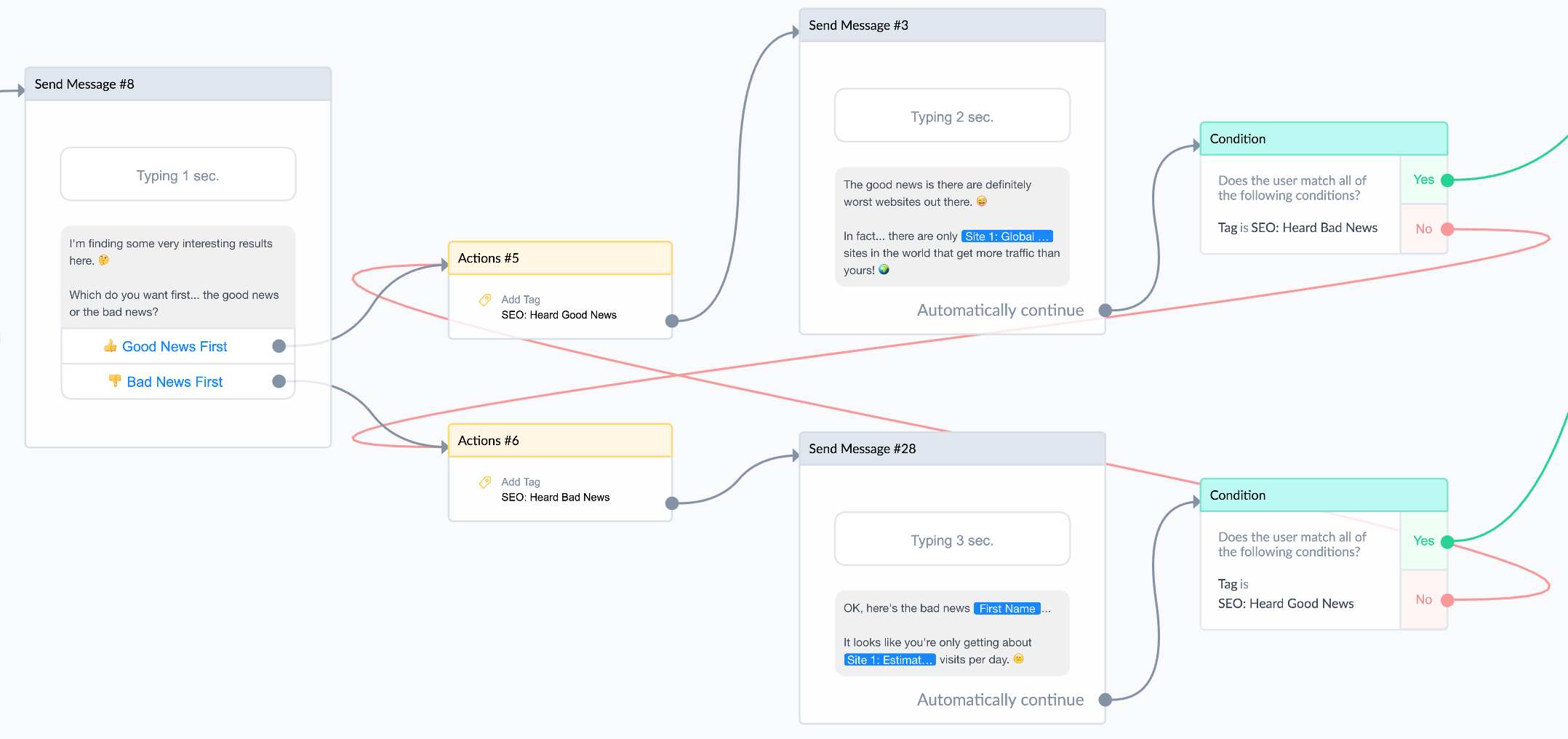
An advanced bot will give users multiple paths to get to the same place, similar to human conversations.
Essential Element to Selling With Chatbots #2. Mine for Data Gold
Tag Everything
Tags are essential for building a dynamic and effective bot. When a user clicks a button, always apply a tag. This will create a record of their likes and dislikes and allow you to unlock the power of conditional logic (if this, then that).
(RELATED: How to Build Your First Chatbot Quiz Using ManyChat Conditions)
We also recommend tagging a user whenever they receive, start or finish a flow. Users can access flows in various ways including the menu, sequences, broadcasts and from within other flows. Tagging will allow you to avoid sending users content they’ve already seen.
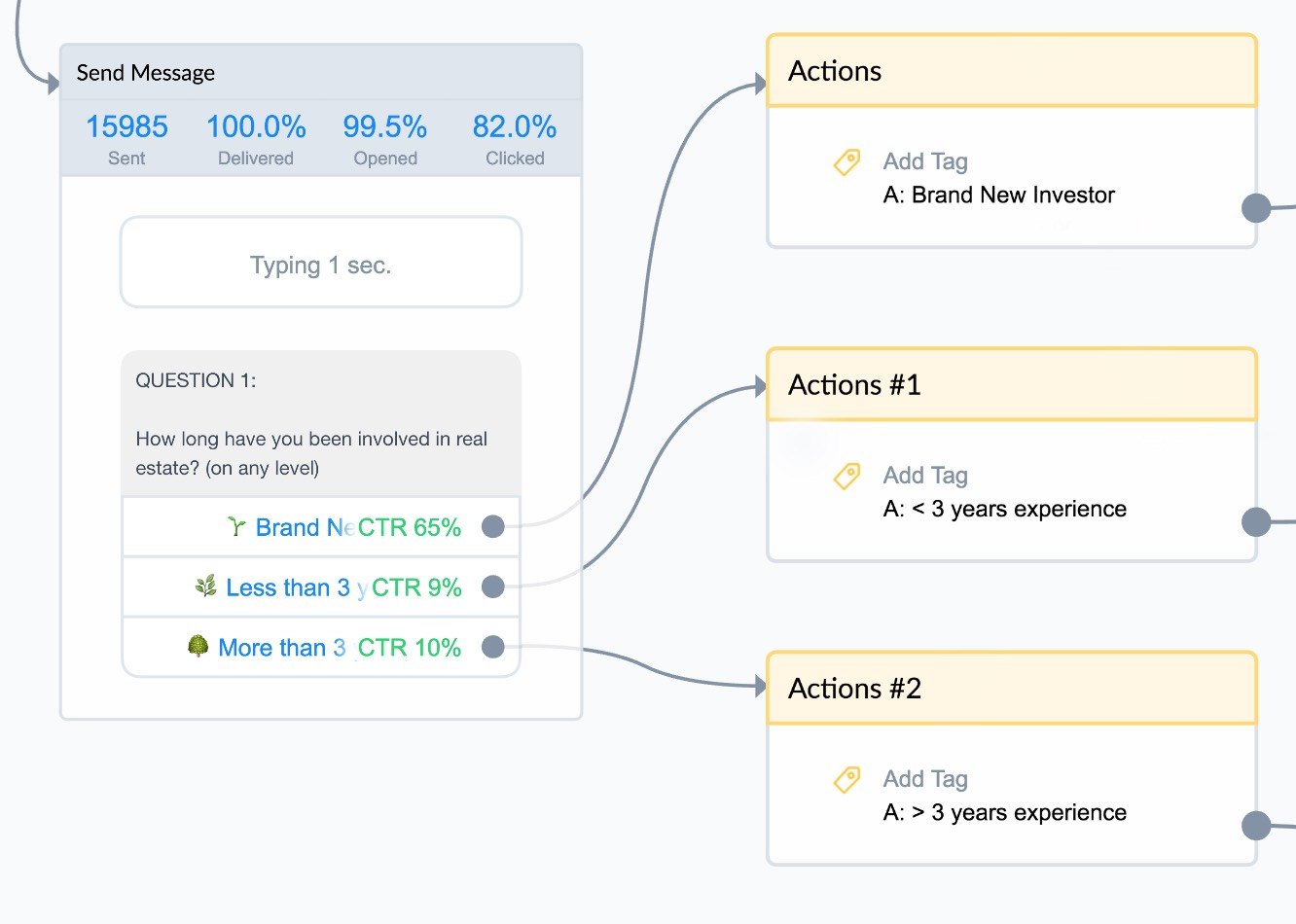
Email Magic
When Messenger Marketing was first introduced to the world by Mikael Yang, many predicted it would be the “email killer”. While the numbers are certainly amazing, when utilized correctly, messenger apps can be more of an email savior than a killer.
Bots are a tremendous way to build your email list. This is largely due to the ability of a user to provide their email with 1-click (and phone number as well)!
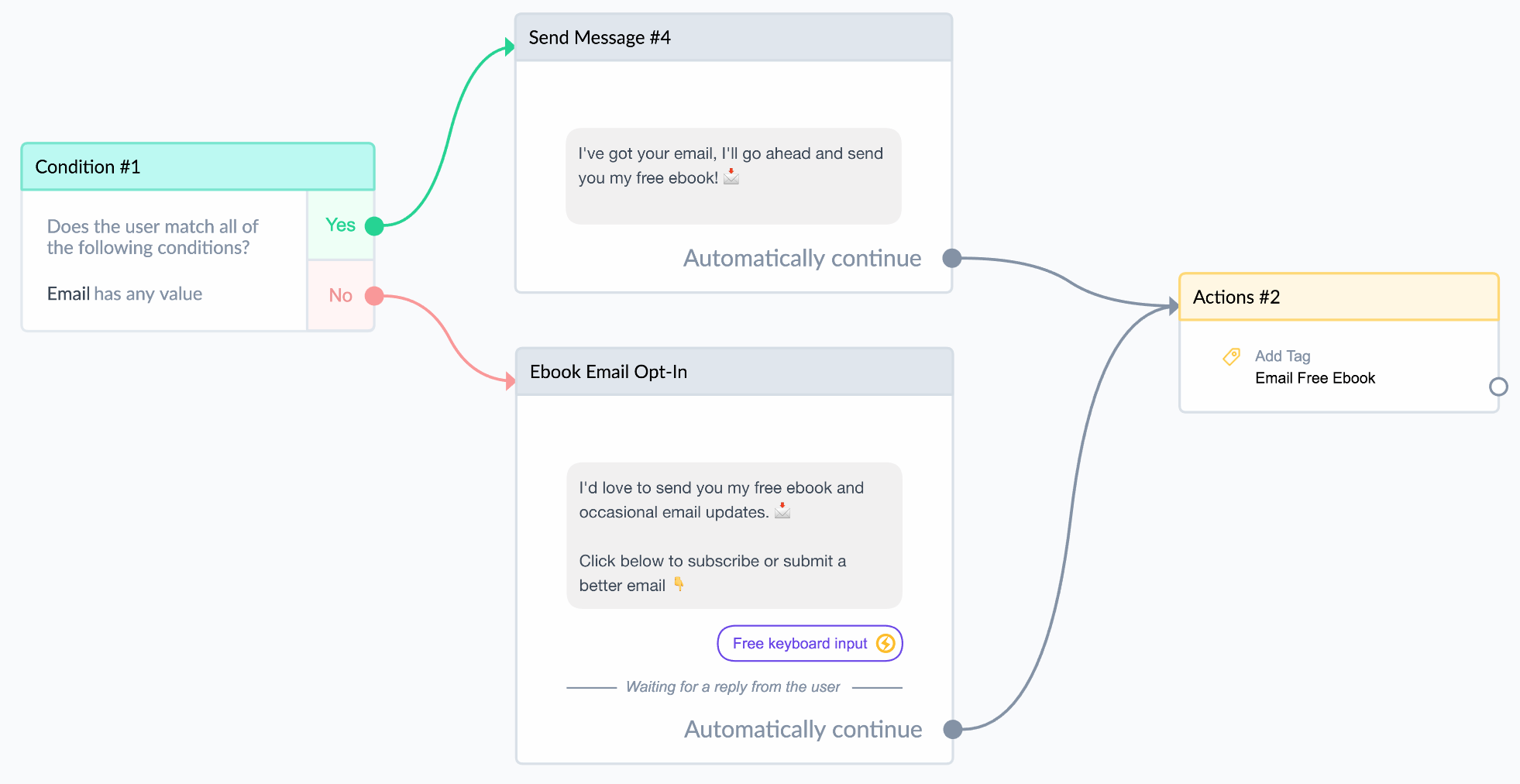
Note that once you’ve collected email and phone, you can utilize conditional logic to avoid having to ask them again.
Retarget Too!
These days, your chatbot marketing techniques should include thinking about your marketing lists (email, phone and now Facebook Messenger), but also your remarketing list as well. One of the great things about selling with chatbots on Facebook Messenger is that you can capture your subscriber’s messenger ID (PSID).
Use a tool like Zapier to integrate with your Facebook ad panel and add your bot subscribers to a custom advertising audience. Remarketing ads to your bot subscribers is highly targeted, cost effective and provides a great user experience.
Keep It Compliant
Keep in mind that GDPR and other applicable laws such as CAN-SPAM (email) and TCPA (phone) also apply when collecting data with bots.
It is worth noting that in addition to phone and email, your bot may be capable of capturing data such as gender and country local from Facebook or whatever platform your bot runs on. Of course, this is all assuming you don’t use the data for evil and you’re always up front with your subscribers.
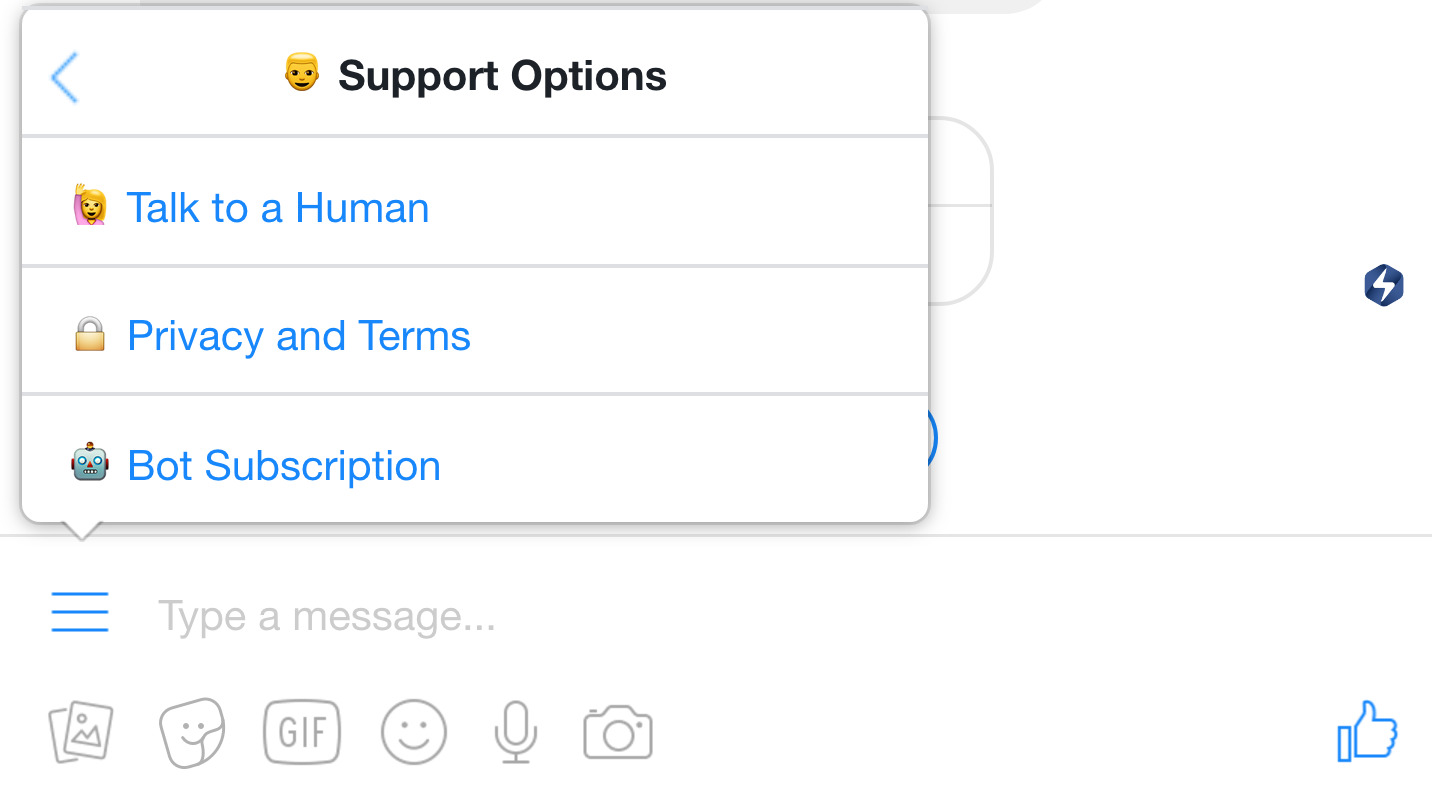
I recommend adding Privacy and Terms to your bot’s main menu.
Essential Element to Selling With Chatbots #3. Split Test to the Bank
Easy Peasy
It’s no secret that split testing is always smart when marketing online. That said, it can be difficult to split test a website, otherwise everybody would do it. Bot platforms like ManyChat make split testing easier than ever. Simply add a “Randomizer” element and you can divide users up in whatever proportion you wish.
Always split test steps that involve user decisions. Most often, these are steps in your flow which have buttons either leading a user down a different path in your flow or to an external webpage.
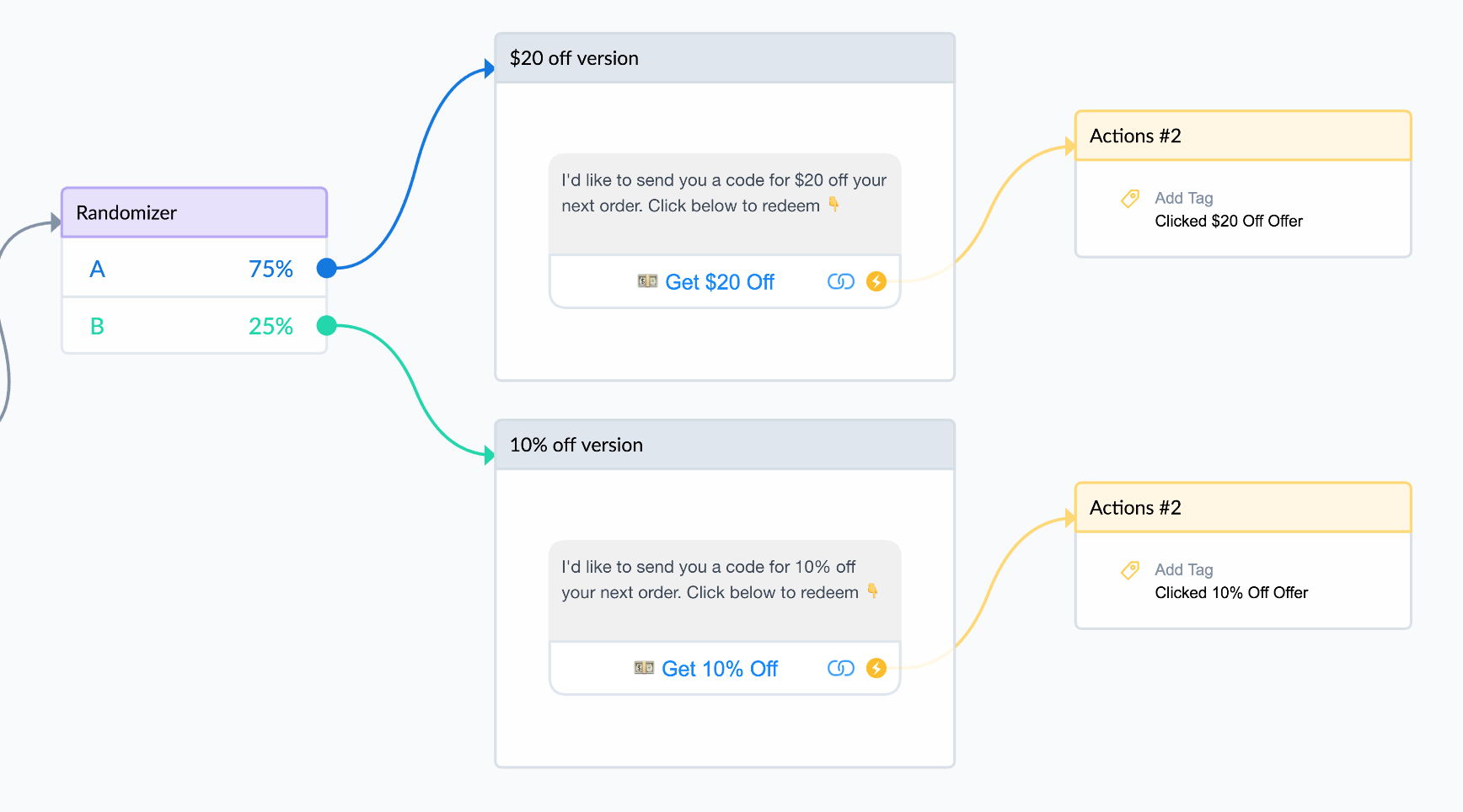
Divide and Conquer
Keep in mind that when A/B testing, it’s not usually wise to divide users up 50/50. Yes, split testing can help you refine and improve. Keep in mind that sending users to anything other than your most effective messaging does come with a cost.
Always keep a control and send a smaller percent of traffic to the message you’re testing. I’d recommend 25% or even less if you have significant volume. When starting a new split test, use your gut to determine which option you believe will do better as you will usually be correct.
Open Up
While it is important to incrementally improve your engagement and website clicks by split testing within your bot flows, there is no place that testing is more important than when sending outbound messages.
It is highly recommended that any broadcast or sequential message you send starts with a split test of at least messages to see which gets the most clicks. Remember, there are lots of message formats you can test including standard buttons, cards, galleries and lists. Try multiple formats to see which gets the most clicks.
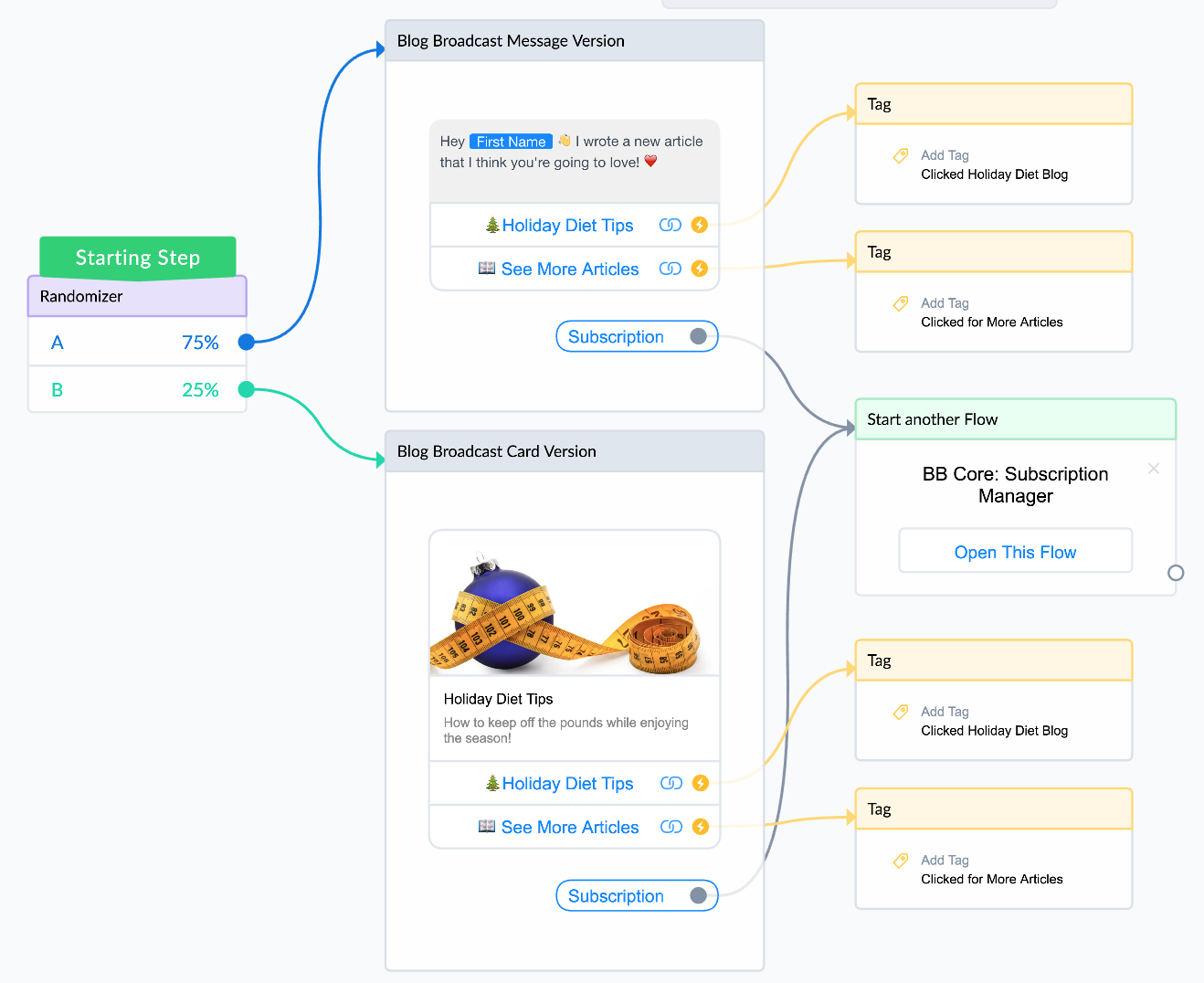
Well Certainly
The best bot building interfaces, such as the Flow Builder, are great because they make processes like split testing as simple as possible. That said, keep in mind that unlike the more advanced testing tools used for websites, you’re not provided any feedback in regard to the certainty of a test.
Unless you’re seeing a crystal clear winner, be sure to run at least a few hundred people to your new variation before deciding to kill either version off.
Level Up
When building, remember that one highly converting flow can potentially generate more sales than an entire website. While the most common bot split tests happens within a flow, you can also think about testing on a higher level.
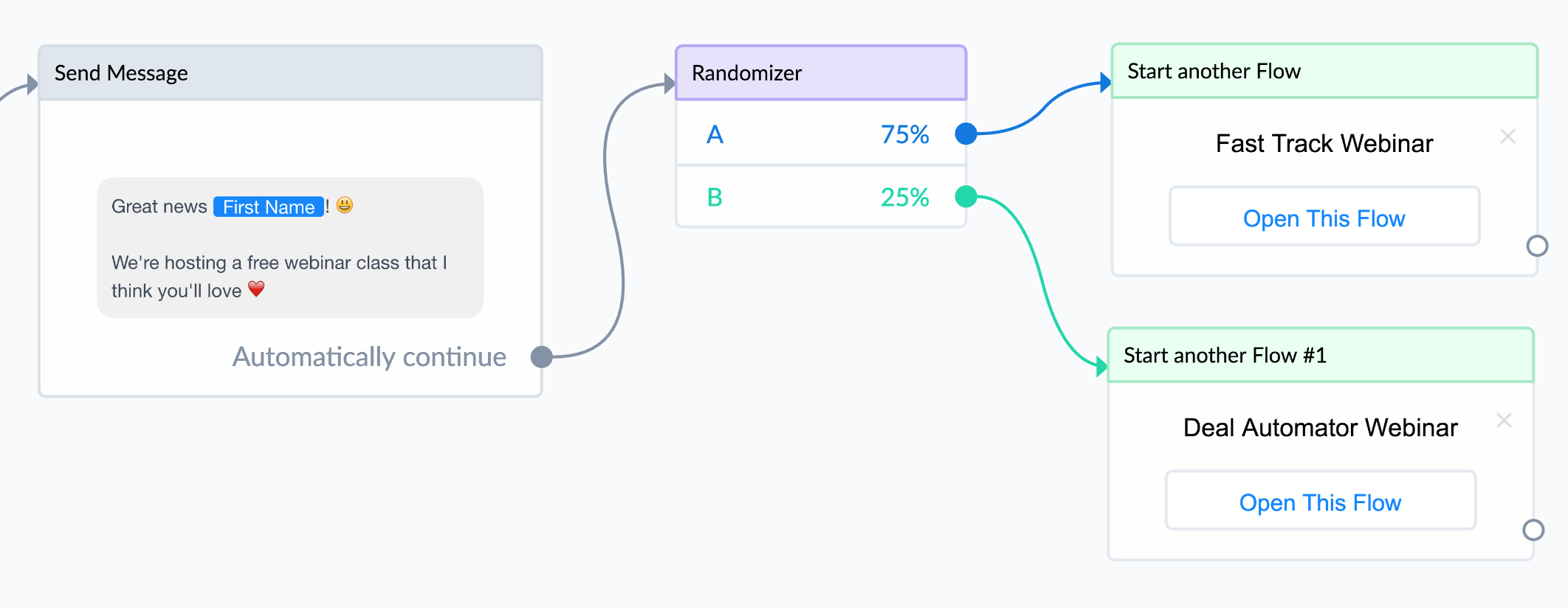
Consider testing multiple flows against each other. If you’re spending on advertising to drive bot subscribers, a high-level test can help you identify your best money maker. We like to call this your “money flow”.
Essential Element to Selling With Chatbots #4. Call Them to Action
Clicks to Sales
Not all clicks are created equal. In addition to higher open rates and click-through rates, the conversion rate from a bot clicker can be much higher than email as well.
When building your bot, you can choose from two primary button types. Standard buttons are our preferred method in most situations as they have higher click rates, but are limited to three button options at a time. “Quick replies” allow for more buttons, but disappear when a user interacts with your bot in any way.
Use quick reply buttons in scenarios where you don’t want users to be able to move backwards, such as a quiz or survey. Just be sure to give clear instructions to ensure users click a quick reply button, rather than submitting text.
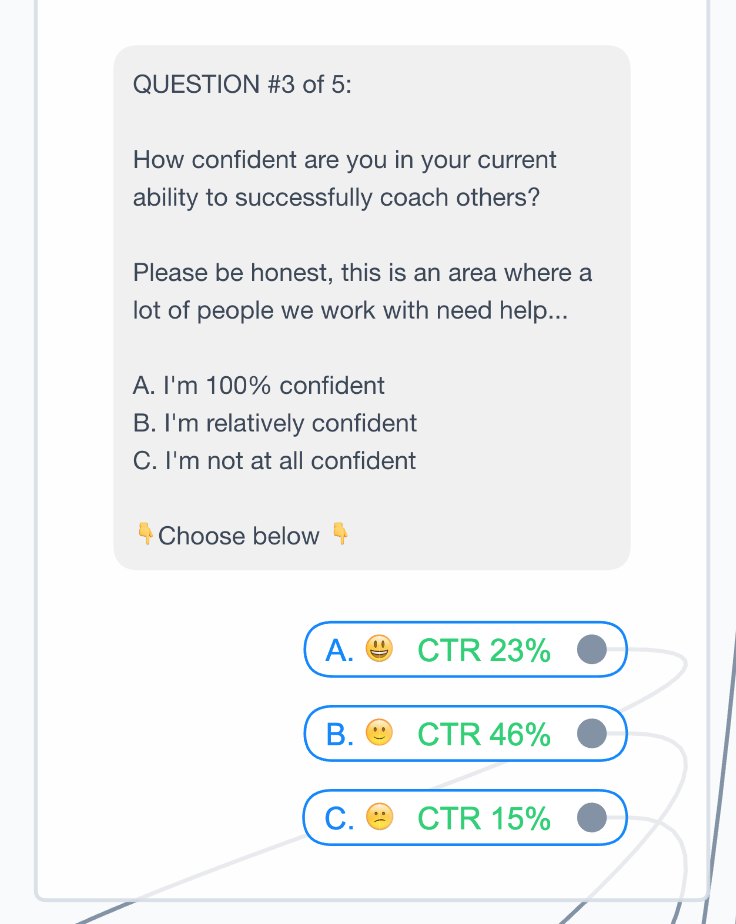
Less Is More
A well designed bot will help users get to where they want in as short of path as possible. Every word counts in a bot, so don’t oversell or waste the user’s time.
With that said, always give users the chance to learn more as desired.
To achieve this, we like to add a “Learn More” quick reply button whenever possible. This maximizes conversions because it allows those who want to take immediate action to do so, while giving added detail to those who want it. It works like a charm.
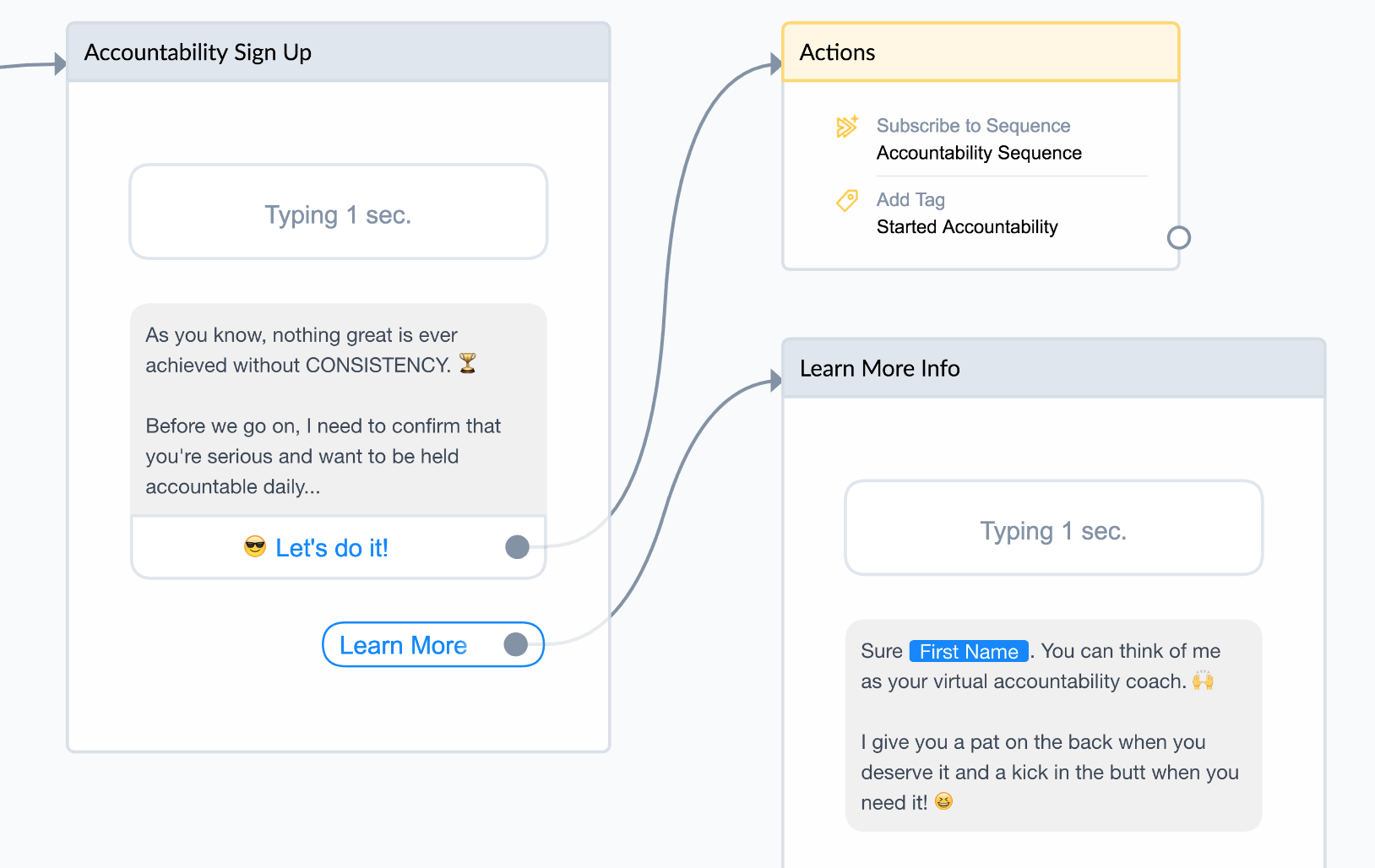
Shiny Objects
Whether you’re using a standard button or a quick reply, we always recommend including an emoji on any button you want clicked. ManyChat has emojis in their message editor or you can go to Emojipedia. That said, there are situations where you might not want to maximize clicks. For example, it is best practice to give subscribers the opportunity to easily opt-out from messaging.
We include a quick reply button below all outbound messages that leads the user to subscription options. That button doesn’t need an emoji.
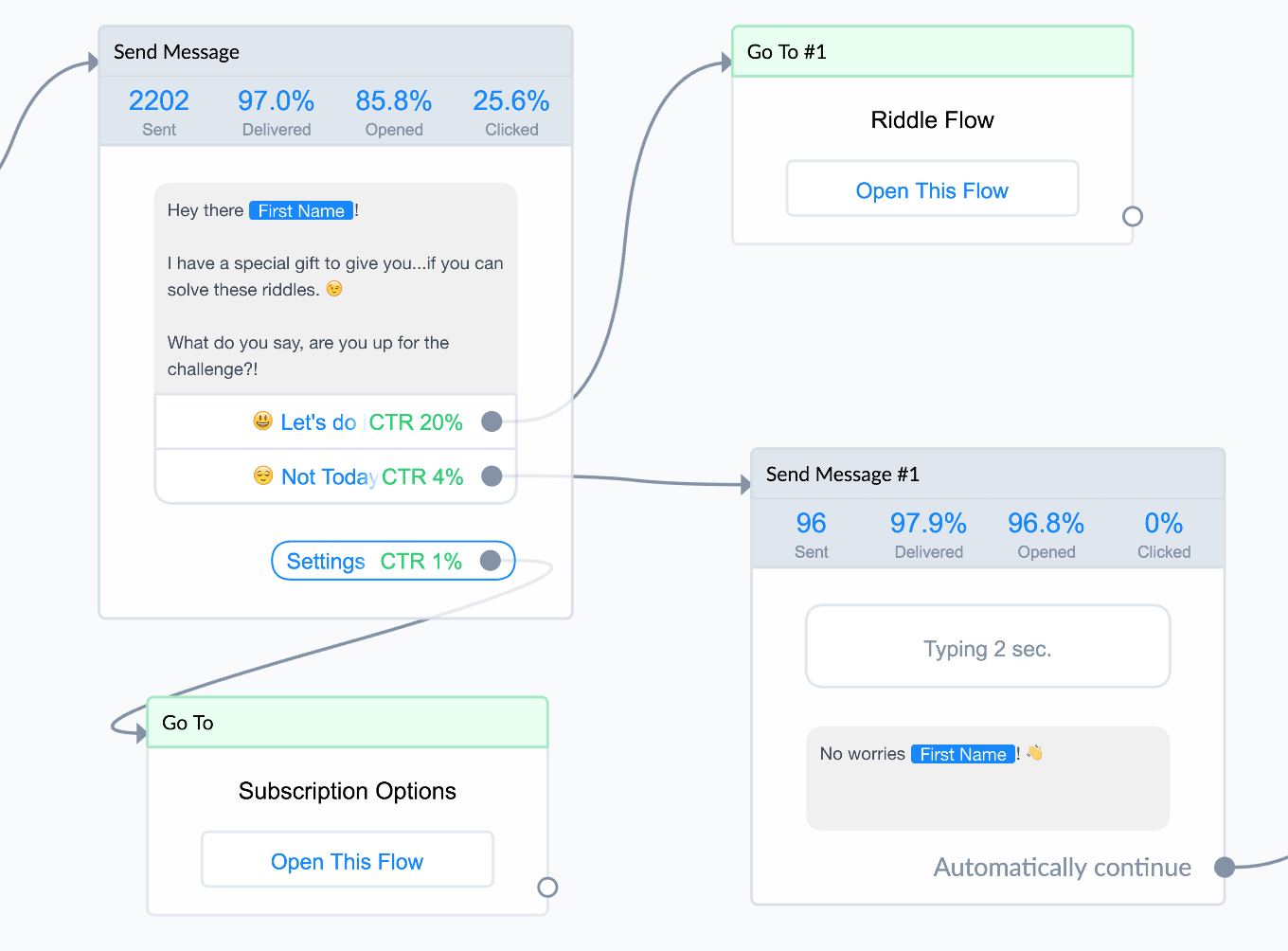
Choose Wisely
People love having choices. Offering multiple buttons will not only increase your total clicks, it also gets people interacting with your bot. This is good for several reasons including the fact that it extends your ability to send the subscriber additional messages using standard messaging (see below).
That said, try not to think of button options simply being either yes or no.
Even if you have one ultimate goal, you can utilize all three buttons by giving them a different spin on the same destination.
Essential Element to Selling With Chatbots #5. The Fortune is in the Follow Up
Multi-Channel
Bots allow you to integrate automated marketing channels like never before, allowing you to maximize sales on autopilot. Use a tool like Zapier to integrate your messenger marketer (bot) with your email marketer (CRM).
Your ultimate goal should be to completely sync your bot and CRM so that an action in one system triggers an action in the other. This generally is done using tags. For example, if a user clicks a sales page link in your bot, a tag can trigger an email to send which includes a discount code to help make the sale.
Bring ‘Em Back
When a subscriber interacts with your bot on Facebook, you can follow up on the conversation using sequences and/or “smart delay” messages. With standard messaging, each interaction a user has with your bot opens a new 24-hour window for follow-up and that’s it. If you want to bring them back into Messenger after the window, use SMS or email re-open the conversation and restart the window.
For example, if a subscriber indicates interest in an offer, you may want to schedule an automated follow-up message to be sent 23 hours later.
Once you get good, you can use conditional logic to customize the sales message based on their previous interaction to maximize conversion.
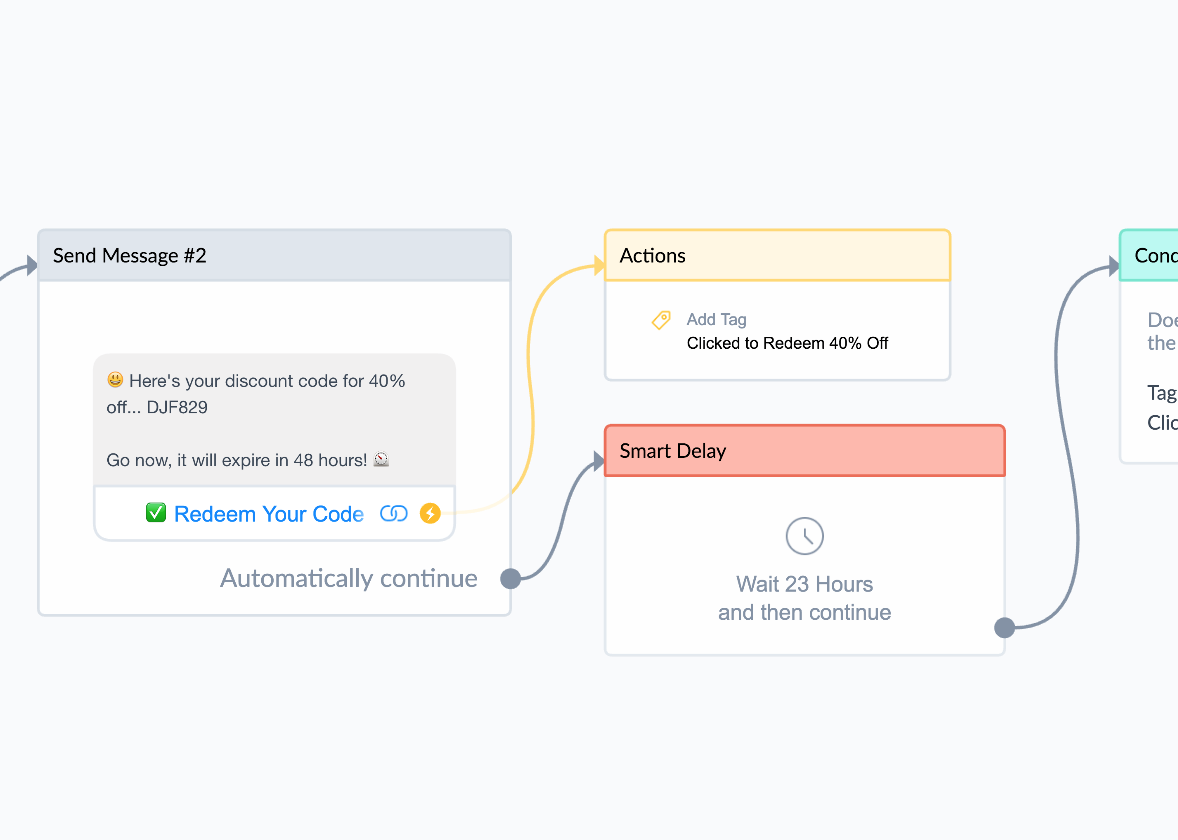
Human Power
Don’t think for a second that your bot is intended to replace humans. Your bot can create more opportunities for your team by scheduling sales calls and sending appointment reminders.
You should utilize actions within your bot flows to notify an admin when a user does anything that indicates an interest in buying. You can do this via email, messenger or by opening a live chat conversation. Note that “live chat” does not always need to be managed live. Bots capture all user interactions which can provide invaluable insights.
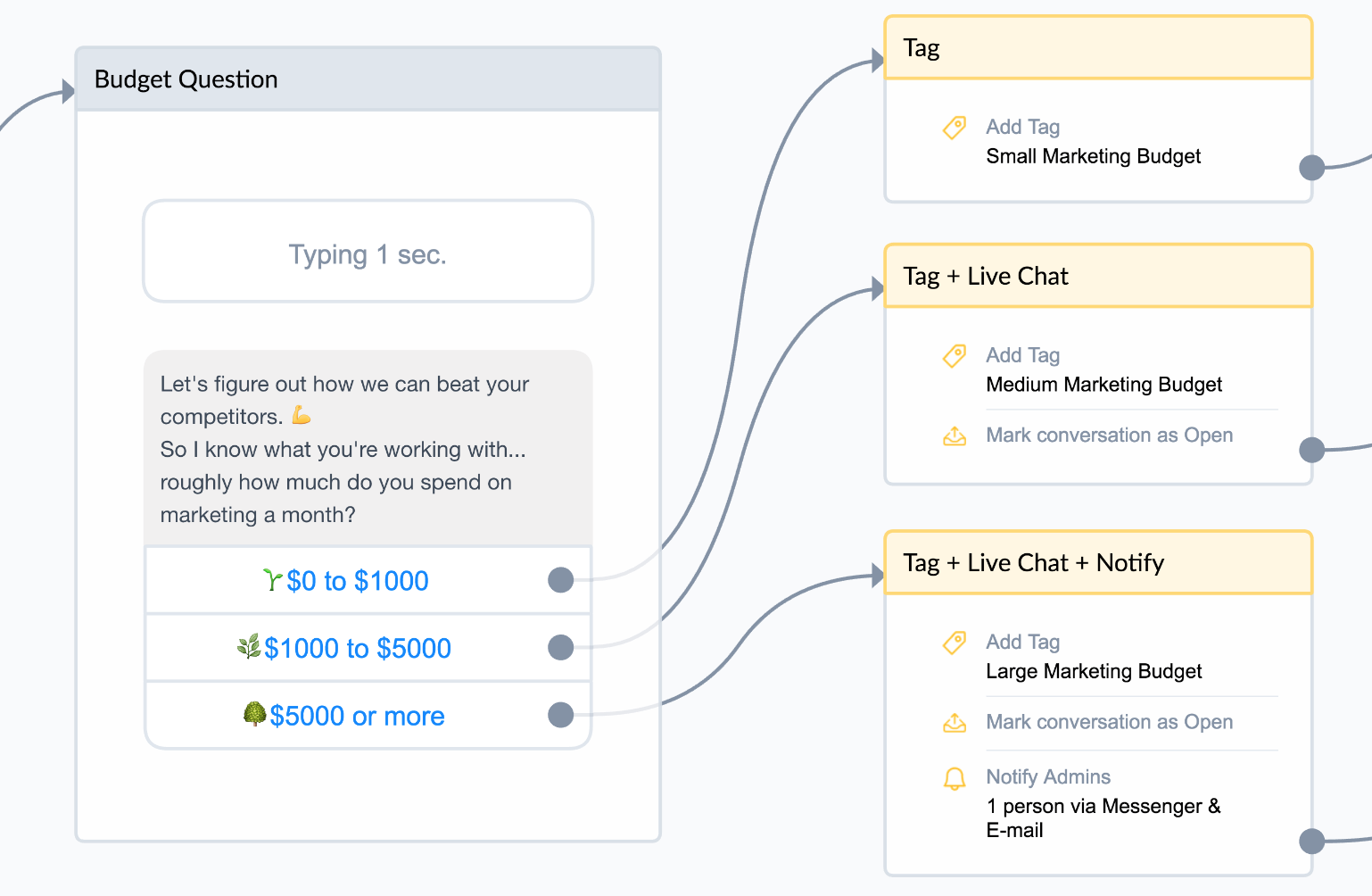
Let’s Recap
1. Start the conversation
2. Collect valuable sales data
3. Optimize with split tests
4. Make your call-to-action
5. Automate your follow up
As you probably have realized by now, the potential of selling with chatbots is virtually limitless.
While building a bot will definitely require learning some new skills, the time you put in is certainly a worthwhile investment. Unlike manual sales processes, time invested into automation can pay dividends for many years to come.
It would be completely understandable if you got through this article and felt a little overwhelmed… but, while this article lays out tons of detail and advanced tips, it all starts by taking the first step. When you implement even a fraction of these ideas into your bot, you’re going to put yourself in front of a massive growth trend.





